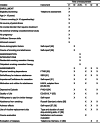Efficacy of a short-term residential smoking cessation therapy versus standard outpatient group therapy ('START-Study'): study protocol of a randomized controlled trial
- PMID: 32576275
- PMCID: PMC7310333
- DOI: 10.1186/s13063-020-04253-x
Efficacy of a short-term residential smoking cessation therapy versus standard outpatient group therapy ('START-Study'): study protocol of a randomized controlled trial
Abstract
Background: In Germany, evidence-based outpatient smoking cessation therapies are widely available. Long-term abstinence rates, however, are limited. Studies suggest that short-term residential therapy enables a higher level of environmental control, more intense contact and greater support among patients and from therapists, which could result in higher abstinence rates. The aim of the current START-study is to investigate the long-term efficacy of a short-term residential therapy exclusively for smoking cessation, conducted by a mobile team of expert therapists.
Methods: A randomized controlled trial (RCT) is conducted to examine the efficacy of residential behavior therapeutic smoking cessation therapy compared to standard outpatient behavior therapeutic smoking cessation group therapy. Adult smokers consuming 10 or more cigarettes per day, who are willing to stop smoking, are randomized in a ratio of 1:1 between therapy groups. The primary endpoint is sustained abstinence for 6-month and 12-month periods. Secondary endpoints include smoking status after therapy, 7-day point abstinence after the 6-month and 12-month follow-ups, level of physical dependence, cost-effectiveness, use of nicotine replacement products, health-related quality of life, self-efficacy expectation for tobacco abstinence, motivational and volitional determinants of behavior change, self-reported depressive symptom severity, adverse events and possible side effects. Assessments will take place at baseline, post-therapy, and at 6-month and 12-month intervals after smoking cessation.
Discussion: There is a high demand for long-term effective smoking cessation therapies. This study represents the first prospective RCT to examine the long-term efficacy of a residential smoking cessation therapy program compared to standard outpatient group therapy as an active control condition. The residential therapeutic concept may serve as a new model to substantially enhance future cessation therapies and improve the understanding of therapeutic impact factors on tobacco abstinence. Utilizing a mobile team, the model could be applied efficiently to medical centers that do not have permanent and trained personnel for smoking cessation at their disposal.
Trial registration: German Register for Clinical Trials (Deutsches Register für Klinische Studien), DRKS00013466. Retrospectively registered on 1 April 2019. https://www.drks.de/drks_web/navigate.do?navigationId=start.
Keywords: Behavioral therapy; Inpatient; Motivational interviewing; Outpatient group therapy; Prevention; Randomized controlled trial; Residential; Smoking cessation.
Conflict of interest statement
Funding sources: JL has received research funding from German Cancer Aid and the German M. Crohn/Colitis Association. AJ has received research funding from German Cancer Aid, the German Ministry of Labor, Health and Social System, Family, Women, and Senior Citizens of the State of Baden-Württemberg, as well as Johnson & Johnson.
Employment/membership: JL has received research funding and speakers’ fees from Pfizer Inc. AJ received counselling fees from Pfizer Inc. and Johnson & Johnson, financial support for talks and workshops from Sanofi, Daiichi Sankyo, Bristol-Myers Squibb, Chiesi and Medical Tribune, as well as from medical training institutes and Education Centres (Volkshochschulen). AJ is member of the AWMF-treatment guideline committee for tobacco dependence.
Figures


Similar articles
-
Effectiveness of residential versus outpatient therapy for smoking cessation: The START randomized clinical trial.Addiction. 2024 Oct;119(10):1762-1773. doi: 10.1111/add.16594. Epub 2024 Jul 10. Addiction. 2024. PMID: 38982899 Clinical Trial.
-
Comparative effectiveness of post-discharge strategies for hospitalized smokers: Study protocol for the Helping HAND 4 randomized controlled trial.Trials. 2020 Apr 16;21(1):336. doi: 10.1186/s13063-020-04257-7. Trials. 2020. PMID: 32299470 Free PMC article.
-
Effectiveness of the national German quitline for smoking cessation: study protocol of a randomized controlled trial.BMC Public Health. 2022 Jul 19;22(1):1386. doi: 10.1186/s12889-022-13742-4. BMC Public Health. 2022. PMID: 35854238 Free PMC article.
-
Motivational support intervention to reduce smoking and increase physical activity in smokers not ready to quit: the TARS RCT.Health Technol Assess. 2023 Mar;27(4):1-277. doi: 10.3310/KLTG1447. Health Technol Assess. 2023. PMID: 37022933 Free PMC article.
-
Different doses, durations and modes of delivery of nicotine replacement therapy for smoking cessation.Cochrane Database Syst Rev. 2019 Apr 18;4(4):CD013308. doi: 10.1002/14651858.CD013308. Cochrane Database Syst Rev. 2019. Update in: Cochrane Database Syst Rev. 2023 Jun 19;6:CD013308. doi: 10.1002/14651858.CD013308.pub2. PMID: 30997928 Free PMC article. Updated.
Cited by
-
Residential treatment exclusively for smoking cessation in patients with Crohn's disease: Results from a pilot study.Tob Induc Dis. 2022 Jun 23;20:60. doi: 10.18332/tid/149481. eCollection 2022. Tob Induc Dis. 2022. PMID: 35836910 Free PMC article.
-
Successful Smoking Cessation among Women Smokers Based on Utilizing National Smoking Cessation Service Type in Korea.Int J Environ Res Public Health. 2021 Jun 18;18(12):6578. doi: 10.3390/ijerph18126578. Int J Environ Res Public Health. 2021. PMID: 34207330 Free PMC article.
References
-
- Stanaway JD, Afshin A, Gakidou E, Lim SS. Global, regional, and national comparative risk assessment of 84 behavioural, environmental and occupational, and metabolic risks or clusters of risks for 195 countries and territories, 1990–2017: a systematic analysis for the Global Burden of Disease Study 2017. Lancet. 2018;392:1923–1994. - PMC - PubMed
-
- GBD 2015 Risk Factors Collaborators Global, regional, and national comparative risk assessment of 79 behavioural, environmental and occupational, and metabolic risks or clusters of risks, 1990–2015: a systematic analysis for the Global Burden of Disease Study 2015. Lancet. 2016;388:1659–1724. - PMC - PubMed
Publication types
MeSH terms
Grants and funding
LinkOut - more resources
Full Text Sources
Medical
Miscellaneous

